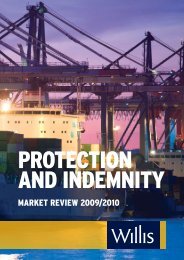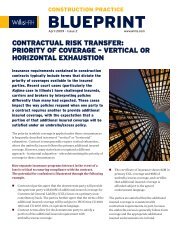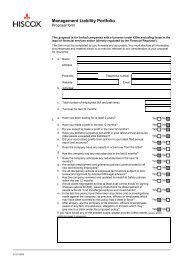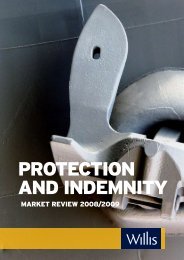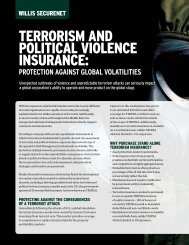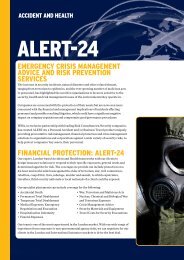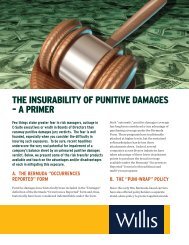spRING 2011 GlobAl MARKETs INTERNATIoNAl - Willis
spRING 2011 GlobAl MARKETs INTERNATIoNAl - Willis
spRING 2011 GlobAl MARKETs INTERNATIoNAl - Willis
Create successful ePaper yourself
Turn your PDF publications into a flip-book with our unique Google optimized e-Paper software.
awaItIng IndonesIan HeadIng mInIng<br />
70 | <strong>Willis</strong> | Mining Market Review <strong>2011</strong><br />
(ii) Decentralisation:<br />
Under the decentralisation framework, regional and local governments gained the<br />
power to issue mining licences and some have issued licences over areas where<br />
existing contracts already exist or contractual negotiations are already underway<br />
between investors and the central government.<br />
For instance, in May 2008, Niko Resources filed suit against the Morowali regional government<br />
in Central Sulawesi over mining rights to the La Sampala nickel deposit. It was said that the<br />
Morowali regional government appeared to have granted mining rights to La Sampala to local<br />
mining companies despite the fact that Niko was concluding its contract with the central<br />
government over the same site. In another case in Central Sulawesi, the regional leader granted<br />
mining licences to various local firms over a deposit already covered by a contract between<br />
the central government and a joint venture between U.K.’s Rio Tinto and the 65% state-owned<br />
mining company, PT Aneka Tambang. In some cases, regional governments imposed taxes<br />
that were illegal under the regulatory framework. The overlapping jurisdictions of local and<br />
central government means investors can find they are subject to overlapping and contradictory<br />
regulatory requirements.<br />
Under the 2008 mining law, regional and provincial governments can grant Mining Business<br />
Licences. The central government will grant the licence if the mining area extends beyond<br />
a provincial boundary or falls within strategic areas under the government’s authority.<br />
The licences will be for up to seven and eight years for metal and coal exploration respectively<br />
and for up to 20 years for both metals and coal production operations. The 20-year period can<br />
be extended up to two times for 10 years each. Previously, investors were not required to obtain<br />
separate exploration and production licences. The requirement under the new law for separate<br />
production and exploration licences raises a risk that an investor having discovered a mineral<br />
deposit may be denied production opportunities from it. A significant change introduced by the<br />
new law is the requirement for mine operators to process ores and concentrates in Indonesia<br />
itself. Presently, the majority of mine production is processed outside Indonesia. Under the new<br />
law, mining companies with existing contracts with the central government for instance, are<br />
required to set up refineries and smelters in Indonesia by 2014.<br />
(iii) The 2008 Mining Law:<br />
The dominance of local mining firms is likely to increase given the implementation<br />
of the 2008 mining law.<br />
The Law on Minerals and Coal Mining (2008 mining law) was designed to eliminate some of<br />
the regulatory and contractual uncertainties under the current frameworks. Under the 2008<br />
law, regional and local government still have the power to issue mining licences but come under<br />
tighter central government supervision. For instance the new law carries a criminal penalty of<br />
up to two years jail for regional leaders who circumvent regulations. Despite such features, the<br />
new law still presents some uncertainty for investors. For instance, under the new law, foreign<br />
investors are required to divest 20% of their interests in mining operations within five years of<br />
the start of operations. Those companies which have entered into joint ventures in which local<br />
companies have at least a 20% stake are exempt from this divestment requirement. Many of<br />
these firms are not as large as the multinational mining companies but are also likely to benefit<br />
from the fact that the new law has substantially reduced the size of mining areas, making it more<br />
feasible for local companies to successfully tender for, win and operate the smaller projects that<br />
will be on offer.



